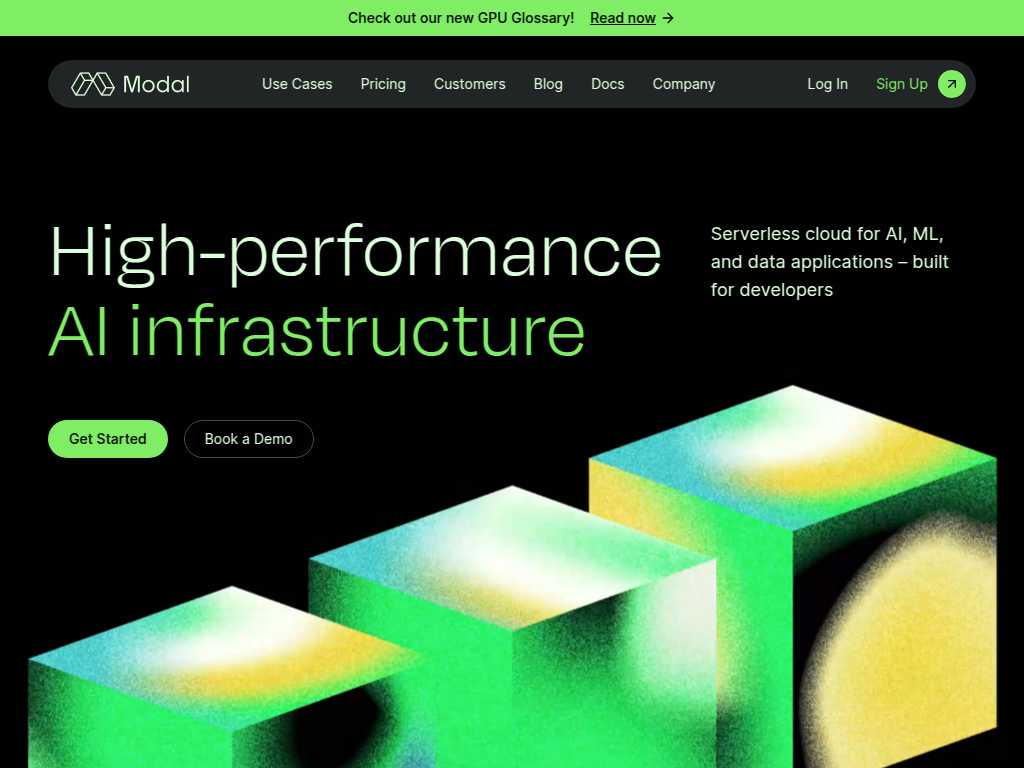Modal
AI Assistant

Streamline Your Compute-Intensive Applications with Modal.
Average rated: 0.00/5 with 0 ratings
Favorited 0 times
Rate this tool
About Modal
Modal is a serverless cloud platform tailored for engineers and researchers aiming to build compute-intensive applications, particularly those requiring AI, machine learning, and large-scale data processing. Its primary goal is to simplify application deployment and scaling, allowing users to focus more on coding rather than managing operational details. The platform's functionality revolves around executing code in containers within its cloud environment. Prominent features include the ability to define custom container images, enabling precise control over runtime environments. Modal excels in horizontal scaling, dynamically adjusting application resources to handle extensive workloads and scaling down when not in use to reduce costs. The integration of GPU acceleration supports intensive AI and machine learning tasks, providing options like Nvidia A100 or H100 GPUs with minimal configuration. Users can expose functions as web endpoints for APIs and web services, with additional support for streaming endpoints and websockets. Modal supports scheduling persistent jobs, including cron jobs, along with features that address retries and timeouts. Its data storage solutions include network volumes, key-value stores, and queues, conveniently accessible via Python. The platform offers seamless cloud storage integration, including popular options like AWS S3 and Google Cloud Storage. Secure sandboxes for untrusted code execution and built-in debugging tools enhance its operational capabilities. It also facilitates integration with systems such as Datadog, OpenTelemetry, Vercel, and Okta, expanding the tool's flexibility and utility. The platform is versatile, suitable for generative AI inference, efficient machine learning model fine-tuning, large-scale batch processing, job queue management, web application deployment, and executing sandboxed code securely. Modal distinguishes itself with an emphasis on ease of use, adopting a code-first approach that simplifies infrastructure configuration. Users have praised its user-friendly design and onboarding process. Built with Rust for enhanced performance, Modal offers rapid cold starts and fast scalability. Python is the primary language supported, with plans to add more in the future. The usage requires the installation of the `modal` Python package and authentication via the `modal setup` command, with resource specifications outlined in code, based on the application's requirements. Modal has seen positive user feedback for its performance and developer experience and secured a $25 million Series A funding round in April 2024, reflecting substantial investor confidence. Recent updates feature improvements in streaming performance, especially for generators and websockets, along with the introduction of a `@web_server` decorator, showcasing its continuous commitment to enhancing user experience and functionality.
Key Features
- Serverless Execution and Pricing
- Rapid Deployment and Execution
- Scalability and Autoscaling
- GPU Acceleration
- Flexible Environments
- Seamless Integrations
- Powerful Primitives
- Developer-Friendly Experience
- Comprehensive Documentation and Support